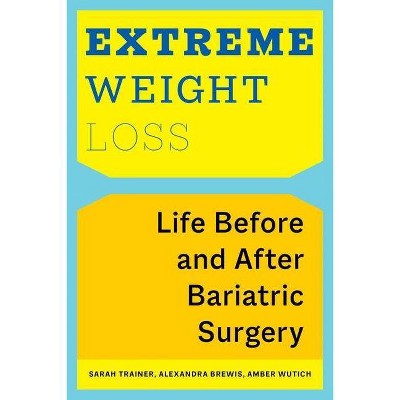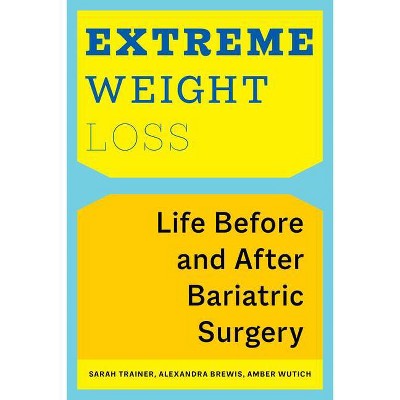Extreme Weight Loss - by Sarah Trainer & Alexandra Brewis & Amber Wutich (Hardcover)

Similar Products
Products of same category from the store
AllProduct info
<p/><br></br><p><b> Book Synopsis </b></p></br></br><p><b>A study that explores patients' perspectives on a life-altering surgery</b> <p/>Bariatric surgery rates around the world have increased exponentially over the past decade. In <i>Extreme Weight Loss</i>, anthropologists Sarah Trainer, Alexandra Brewis, and Amber Wutich provide us with an inside look at how patients experience this medical procedure, as well as its far-reaching and complex personal implications. <p/>Drawing on patient interviews, survey data, and more, Trainer, Brewis, and Wutich explore why people decide to undergo bariatric surgery, and how that decision transforms their lives. They show, in painstaking detail, how the journey to weight loss is can be at once painful and liberating, dispiriting and self-affirming. <p/><i>Extreme Weight Loss</i> explores questions about which bodies are treated as though they belong in modern societies, and which bodies are treated as unwanted. It considers how people challenge and manage these unfair standards, illuminating what it means to be large-bodied in America's diet-obsessed culture.</p><p/><br></br><p><b> Review Quotes </b></p></br></br><br><i>Extreme Weight Loss </i>is that rare book that tells us not only about its subject, but also serves as a prism through which to view some of the cultural patterns that characterize a society. For anyone interested in women undergoing bariatric surgery and the clinical settings in which this takes place, this ethnographic study is jam-packed with rich, nuanced detail. The authors take us on a journey into a culture where, despite contemporary rhetoric on valuing all bodies, thinness ideals remain intractable, fat bodies continue to be pathologized, and the ability to lose weight - or not - is a moral status. The bariatric patients described here are not victims: they are deeply aware of the ways in which they are circumscribed by cultural ideals that render them unwell and unworthy. The real power of this book is in what we learn about why these women submit to the judgement, surveillance, and intervention that our society imposes on those deemed unfit. This is a story not just about body weight, but about the ways in which we weigh down those who don't fit.--Jodi O'Brien, editor of Encyclopedia of Gender and Society<br><br>While this accessible and empathic ethnography of a cohort of bariatric surgery patients describes the extremes of obesity and of body transformation, it speaks to our wider struggle with weight control and disordered eating. The authors present a sophisticated anthropological analysis of the social, economic, political, and psychological consequences of being "fat" in the US, yet they never lose sight of the voices of the patient-participants and their hopes and challenges through their bariatric surgery journey. <i>Extreme Weight Loss</i> is a must-read for anyone concerned with the body, stigma, and surveillance in the 21st century.--Tina Moffat, co-editor of Human Diet and Nutrition in Biocultural Perspective: Past Meets Present<br><p/><br></br><p><b> About the Author </b></p></br></br><p><b>Sarah Trainer </b>is the Research and Program Coordinator at Seattle University for the National Science Foundation-funded SU ADVANCE Program. <p/><b>Amber Wutich</b> is Professor of Anthropology in the School of Human Evolution and Social Change at Arizona State University and co-author of <i>Analyzing Qualitative Data: Systemic Approaches, Second Edition</i>. <p/><b>Alexandra Brewis</b> is President's Professor in the School of Human Evolution and Social Change at Arizona State University and Co-Director of the Mayo Clinic-ASU Obesity Solutions. She is the author of <i>Obesity: Cultural and Biocultural Perspectives</i>.</p>
Price History
Price Archive shows prices from various stores, lets you see history and find the cheapest. There is no actual sale on the website. For all support, inquiry and suggestion messagescommunication@pricearchive.us



















